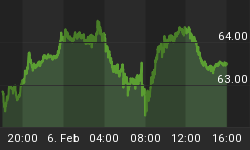Several legislative initiatives caught our attention recently. All of them are related to the monetary role of gold and range from proposals to return to the gold standard, to minting gold and silver as an alternative currency, to having all state transactions carried out in gold and silver coins, to permitting citizens to run their own mints.
Do these proposals signal a significant attitude change among politicians and mainstream economic institutions toward gold? No. They are largely regarded as fringe ideas and dismissed out of hand. The third link above is written in a condescending tone that implies everyone knows that the gold standard is bad for an economy and it caused the Great Depression. Still, it's quite telling that opinions that gold can be incorporated into a modern economy are becoming numerous, and actually making it onto the legislative agenda in various jurisdictions.
Last November, clearing house ICE Europe began accepting gold bullion as initial margin for crude oil and natural gas futures. This year, JPMorgan Chase announced that it would accept physical gold as collateral for a number of transactions. According to the Wall Street Journal, stock exchanges in New York, Chicago and Europe recently agreed to accept gold as collateral for certain trades, too. The World Gold Council is gaining traction in its push to have the Basel Committee on Banking Supervision accept the precious metals as a Tier-1 asset for banks, along with government bonds and currencies. Private and public institutions alike are clearly rethinking their attitude toward gold.
Perhaps most telling of all, the world's central banks were net buyers of gold in 2010 and in 2009, after being net sellers for the previous 20 years. As World Bank President Robert Zoellick said last November, gold has become the "yellow elephant in the room" that needs to be acknowledged by policymakers of major economies.
No one can predict exactly how this will all shake out, but Doug Casey has long said that a return to a gold standard, or some modern equivalent, is almost inevitable. That's because, for the reasons Aristotle outlined 2,000 years ago (it's durable, divisible, consistent, convenient, and has intrinsic value), gold is hands-down the world's best money.
Now, Gresham's Law tells us that bad money drives out good, but that's only true when legal tender laws hold sway (incentivizing people to hoard what's perceived to be "good" money and spend the "bad" money as fast as they can). When people give up on the local legal tender, Gresham's Law goes into reverse, and good money chases out bad. The dollarization of third-world economies is an example of this, the dollar being perceived as being good when compared to many shakier currencies.
So, what happens if fiat currencies as a class start to be perceived as bad money? Gresham, and history, tells us that they'll eventually be abandoned, unless made good (put back on some acceptable standard of value, like gold).
The key point here is that it can't happen just a little bit, just as you can't get a little bit pregnant. Once it starts, the good money will drive out the bad, and in today's wired global economy, the phenomenon will be worldwide, fast and devastatingly thorough.
The investment implications, broadly, are obvious; you want to own gold for safety and speculate on gold stocks for profit. The details on how best to do this are the current raison d'être of our metals publications.
In light of the information above, it seems that the Mania Phase of the gold bull market is getting closer every day. You'll want to stock up on gold, silver and sound large-cap mining stocks before the investing crowd catches on. There's still time, but it may be running short. To learn everything about prudent precious metals investments, give BIG GOLD a try today. Read our report on how Jeff Clark managed to boost his mom's IRA - and his subscriber's portfolios - by 90.4%... and how, for only $79 per year, you can do the same...]















